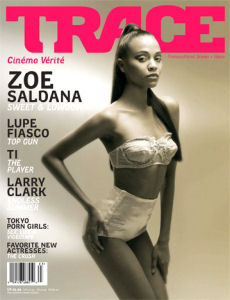TRACE: Trendy Transculturalism

Multicultural glam and glitz are the spicy main ingredients in Trace, an ambitious glossy published eight times a year from an address on Broome Street in lower Manhattan.
In a recent issue editor-in-chief Claude Grunitsky noted that "the last time Mary J. Blige was on our cover, back in the spring of 1997, the magazine was being published out of a dark, underheated basement below my bedroom, on London's Clerkenwall Road."
Trace has come a long way from those humble beginnings, and seems to have found a happy headquarters in the USA, land of hip-hop, celebrity worship and pots of money to be found in unlikely places, although it still publishes a UK edition. And Trace pointedly eschews the term "multicultural," preferring "transcultural."
A typical Trace portrait is that of Rachel Roy―no, not the cooking queen, that's Rachael Ray―who attained celeb status because of her marriage to Roc-A-Fella Records CEO Damon Dash, and who has become a fashion designer with hubby's Rocawear line. That she's gorgeous and grew up in modest circumstances in northern California of mixed Dutch-Asian Indian parentage all count for points with Trace, which is clearly impressed with her loyalty to her hip-hop mogul husband despite his numerous well-publicized affairs, including one with the late singer Aaliyah.
Most of the articles in Trace seem to be written by the music editor, Omar "Calabash" Dubois, a master of murky language with attitude. A random example from the cover story: "Mary J. Blige has always lived a movie―she's never lived by rules. (Go do the research.)" I always thought it was up to the writer, not the reader, to do the research.
Despite my own attitude regarding "Calabash," he did write a piece in the issue that I enjoyed. Titled "Booster's Redemption," it tells of how back in late 1980s Brooklyn the Brownsville-based Polo USA (United Shoplifters Association) joined forces with the Ralphie Kids from Crown Heights to form The Lo-Lifes, who made the shoplifting of trendy clothing items an art form. Simultaneously, current rap singer/producer Taz Arnold began doing the same thing in Los Angeles, and he had a similar fixation on Polo wear:
"…you had a lotta cats who were into the Polo game but really weren't boosters," says Taz, rolling his eyes. "They bought their way into being fly. You had people spending thousands of dollars―breaking their neck at a FedEx spot!―just to be dressed head to toe in Polo. We looked at them as suckers, like: 'You paid for that?? I would never have paid for that! You're a clown! You're breaking your neck trying to be me when I'm being me for free! You're doing this shit just to get some pussy, I'm doing this shit because I'm passionate about it!' I was the number one Polo Booster: God of Polo from '88-'98."
The photos of fashionable young transculturals in Trace are frequent, large and well-crafted, and you'll also encounter a number of short items about pricey products such as Jhung Yuro's $300-plus walking shoes and rapper 50 Cent's line of G-Unit watches that includes the world's first MP3 timepiece, with a capacity of 240 songs.
Is there an undercurrent of satire in this rich and tasty stew of ritz and Ritz crackers? My surviving brain cells were scrambled by a very short essay called "Luxe for Life" that I encountered on page 79. It's by the magazine's editor at large, Stephen Greco, and I'll give you all of it:
Is there any concept evolving faster than luxury? Old definitions of prestige, comfort and extravagance are fast eroding, along with a host of outmoded notions about class and value. New personal agendas in the realm of aspiration, fantasy and desire―and fresh individual strategies meant to transform them into reality―have made today's luxury more self-referential than ever before. It's not so much about being "better" than other people, but surpassing (and surprising!) yourself.
In fact, as we wanted to show in this issue, luxury now is more spiritual than ever―whether it's about reclaiming the standards of life that have diminished since the Industrial Revolution (privacy, harmony with the planet, etc.) or setting new standards for the future, as Grace Jones and the others in this issue are doing, with bad-ass, go-for-it, luxe-for-life optimism…While Trace publishes eight issues a year, I can't find any info in the magazine about whether you can subscribe (if you can find a copy at a newsstand, you'll pay $5.99). Of course, we'll be happy to send you a sample copy for $2.59.

